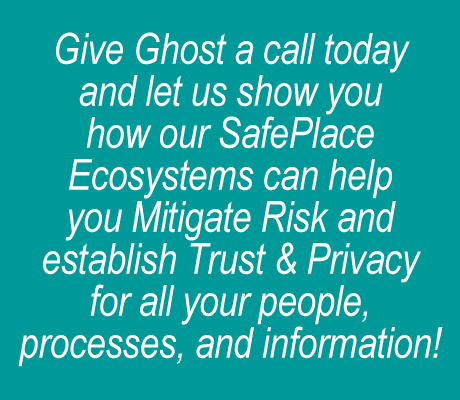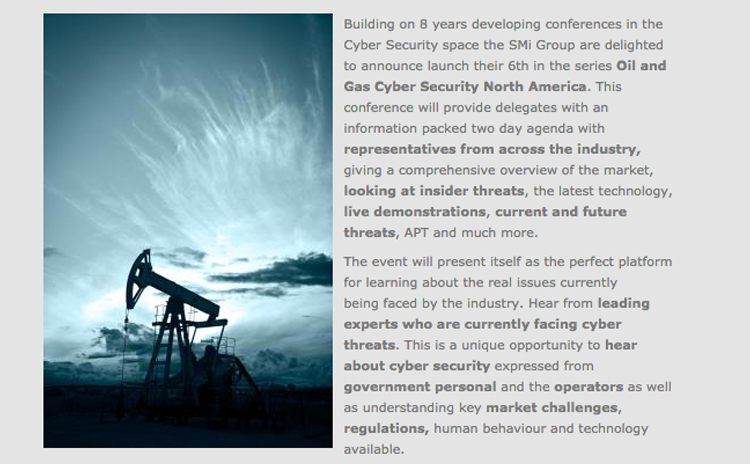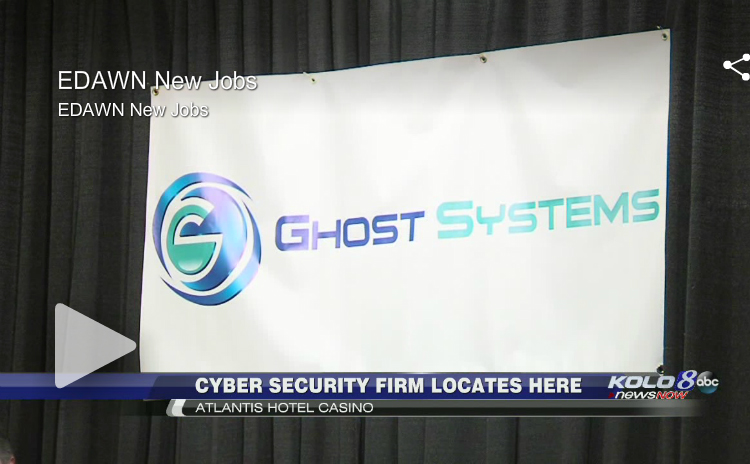
About Us
Our Mission is to maintain a complete future-proof cyber security infrastructure – The Internet of Trust™ – built to the very highest modern standards by a team of highly experienced specialists, using the best-in-class patented technologies. This infrastructure is made available to government, businesses and consumers on a supply contract basis, tailored to the requirements of that organization or individual. We are the only company offering fully integrated end-to-end holistic cyber security as a service.
Investors
Ghost Systems, Inc., founded in 2014, and headquartered in Reno, Nevada with satellite offices in the US and UK, is a privately held limited liability company, funded by the founders, private investors, and leading Silicon Valley companies. The management team is a seasoned group with broad experience in all aspects of running successful businesses.
Ghost serves companies around the world in Financial Services, Healthcare/Pharma, Government and Enterprise markets.
Ghost has a summary presentation available for serious investors interested in owning a position in the company. For more information about the company and how you can invest in Ghost, please contact us using our contact form.
Careers
Innovative Technology Leadership
Ghost is quickly moving to become the leading provider of data privacy solutions for digital information of all types.
Recognized for our innovative, trusted and private digital data distribution platform, Ghost extends boundless imagination and creative thinking to everything that we undertake. Our team has years of experience in business, technology development and implementation in many major industries. And we have created a very open and encouraging environment that allows employees to pool their many interests and skills.
In short, the Ghost culture is as unique as our technology, which is why we consistently attract top-flight talent. The company offers very attractive benefits and other great perks.
We are always happy to hear from energetic and creative individuals. If you have unique talents and are interested in being a part of the Ghost team, please email your resume, with your position interest in the subject header, using out contact form.
Or Alternatively, You Can Snail Mail to:
Human Resources
Ghost Systems, Inc.
200 S. Virginia
Suite 500
Reno, Nevada 89501
Partners
Ghost Systems works in partnership with technology companies, security industry groups, value-added resellers (VARs), service providers, systems integrators, data center operators and consultants to ensure that our products and services are continuously evolving to meet the needs of our customers.
- Reseller - Reseller partners are companies which sell Ghost’s products and services and typically provide services or are paired with service partners. Ghost offers a two-tier Reseller model;
- Basic Resellers: Sell direct to the customer. (VAR’s, Distributors, etc.)
- Master Resellers: Sell direct to the customer. Bring to Ghost and manage, Basic Resellers (VAR’s, Distributors, etc.)
- OEM's - Companies which combine Ghost technologies with their own technologies to create new products for target markets.
- Strategic - Strategic partners are those companies that through their technology, ubiquity and focus, create new markets and new opportunities for Ghost. Our strategic partners have made corporate-level commitments to develop these new opportunities with Ghost.
- Technology - Technology partners include companies whose technologies and/or services Ghost resells and/or integrates into its offerings.
- Service - Service partners are organizations who are pre-qualified to provide event, implementation or integration services for our products and services. Service partners help ensure the highest quality experience for our mutual customers.
- Marketing - Marketing partners sell products and services that are complementary to our product and service offerings. They may provide products and services to existing customers or to prospective customers.
- Affiliates - Affiliate partners are people and/or organizations that have agreed to sell Ghost’s products and services through the Internet. If you are interested in working more closely with Ghost Systems in any of the partner categories listed above, contact us using our contact form..
Industries
These days, protecting an organization's data requires more than a strong perimeter defense. Cyber-criminals are having little trouble knocking down perimeter walls. And the walls behind them. Perimeter and multi-layered defenses can help with malware and other concerns, but with insider invasions commonplace and more applications directly accessible to remote users and systems, the concept of the network perimeter as the core data defense strategy is becoming increasingly challenging. It's just far too easy to bypass perimeter controls.
Once an intruder penetrates the perimeter defenses, there's nothing else to protect company assets. Frighteningly, it's as easy for hackers to get files out according to this excerpt about the RSA breach: "The attacker then used FTP to transfer many password protected RAR files from the RSA file server to an outside staging server at an external, compromised machine at a hosting provider. The files were subsequently pulled by the attacker and removed from the external compromised host to remove any traces of the attack."
Ghost Systems' SafePlace Ecosystem™, based on proprietary, patented and trusted technology, is a hardware agnostic computing environment with a zero-footprint. It's the only solution that protects data on the network from the inside out, making the data self-defending and undetectable. The data becomes invisible. Picture a thief looking through all of the windows of a house. The house appears empty, yet the all the household furnishings are there.
For varying and unique reasons, enterprises, government agencies, healthcare providers, and financial services organizations must gain better control of the information traversing their network, how that information is used, and who can access it. Let Ghost Systems show you how.
Financial Services
It's quite simple. Customers of financial institutions expect their information to be secure and private. So does the government. In an effort to protect both public and private individuals and organizations, federal and state agencies have put financial institutions under intense pressure to comply with security mandates and regulations.
-

Financial Services
(775) 335-1946However, the prevalence of fraud, as well as credit card and identity theft is undermining customer confidence in online banking services and jeopardizing opportunities for more profitable revenue generation. The institutions that are successful in persuading customers to enroll in online banking, and take advantage of features such as online bill pay, can halve the average cost of servicing those customers. In addition, since financial institutions compete in global markets requiring 24×7 processes, they are dependent on dynamic information access.
Financial institutions looking for the most secure way to protect data must overcome these following realities:
A growing volume of digital information is in constant motion and transformation throughout its lifecycle, making it vulnerable at many points along the way.
Information often leaves the secured network perimeter via laptops, PDAs, email and backup tapes, and is frequently handled by contractors, temporary staff, outsourcers, as well as permanent employees, which can open up more points of exit and entry in the network, not to mention authentication challenges.
Recent events involving network breaches of companies, thought to be among the most secure in the world, indicates that the approach has to change from securing the perimeter to protecting the information itself.
Mid-Market
Around the globe, nearly all business is being conducted electronically, both within the firewall and remotely. The number of employees, partners, and suppliers, and the volume of sensitive data accessed and stored on laptops, workstations and servers is growing exponentially. Is that data protected? A rapidly growing number of successful intrusions suggest not.
-

Mid-Market
(775) 335-1946What’s gone wrong? Tried and true security tactics no longer work to protect data. Traditionally, enterprises have focused on securing the network perimeter and using static passwords for internal authentication, usually within the firewall. Nowadays, however, hackers are much more effective than ever at successfully penetrating the perimeter. Once in, weak internal security is providing little or no effective defense against those attackers, whom are moving freely through the enterprise infrastructure, browsing and choosing between data that may be of value.
It’s no wonder regulations have been issued to ensure the security, integrity, and privacy of sensitive data. Faced with the prospect of an audit and non-compliance, enterprises without security that can’t be compromised are understandably concerned. What enterprises need to do today is rethink their approach and start securing the network proactively, starting from the inside out with self-defending data. Ghost offers products that proactively defend data.
Will 2015 Be the Year of the Healthcare Hack?
So far this year, hackers have pulled off two massive healthcare breaches, in what appear to be sophisticated attacks. But are the Premera Blue Cross and Anthem breaches just a coincidence, or are they part of a larger trend that could affect other healthcare companies this year?
-

Healthcare
(775) 335-1946The rapid evolution of digital technology has been responsible for many innovations in patient health care delivery. One of those is the proliferation of Electronic Health Records (EHR). The move to electronic health records (EHR) has been underway for several years now, and received its first major boost in 2009 with the federal stimulus bill. To effectively manage patient care, nurses, doctors and health care givers need access to EHRs and related protected health information (PHI), residing across complex and dispersed network infrastructures.
Beginning this year, medical practices will be penalized 1% of Medicare reimbursements if they fail to meet federal requirements for digitizing patient medical records.
As a result, we can expect to see more healthcare organizations increasing their use of EHRs, which are rife with software and storage bugs, and weak security.
Multiple locations and access points present a security challenge. Confidential PHI can be found through the healthcare environment — on laptops, clinical workstations, USB drives, networks, clinical applications, patient portals, and mobile devices, with access taking place inside and outside the corporate firewall. As the quantity of data, users and access points increases, so does the number of security breaches.
If current Cyber-security technologies work so well, why do the cyber-thieves keep winning?
The fact that it was even possible to breach these networks points to inherent flaws in the security paradigm deployed by most healthcare organizations. Perimeter security and firewalls are no longer enough to prevent network intrusions. It’s time for a different approach that offers self-defending data from the inside of the network out, and truly unbreakable encryption that goes far beyond the Advanced Encryption Standard (AES) 256 standard, which clearly is capable of being broken.
- Nearly one quarter of healthcare organizations reported a security breach in the last year.
- High-profile breaches are occurring almost daily and on a global scale
- 97% of healthcare CIOs have expressed concerned about data security — and rightfully so.
- 94% of polled healthcare institutions admitted patient records had been exposed by data breaches
- Healthcare is the worst U.S. economic sector when it comes to data breaches caused by lost or stolen devices
- One of the biggest repositories of Social Security numbers, as well as other valuable identifiers like insurance accounts, is the healthcare sector.
Study after study by HIMSS, Ponemon, Verizon and others continually shows that the healthcare sector has long been, and continues to be a target of hackers. Identity theft is a lucrative black market business and these companies are repositories for some of the most sought-after data by cyber-criminals. The personal information stored by healthcare companies is a goldmine for this sort of activity, which is why we're beginning to see highly sophisticated attacks against major healthcare groups - like the Premera breach disclosed earlier this month, as well as Anthem and Community Health Systems last year. The exposure of 11 million personal records at Premera, and another roughly 80 million at Anthem, signifies a dramatic shift in the cyber threats faced by this industry. Far from an anomaly, it appears to be the start of a more sophisticated hacking campaign on healthcare companies across the globe.
Government/DoD
It's quite simple. Customers of financial institutions expect their information to be secure and private. So does the government. In an effort to protect both public and private individuals and organizations, federal and state agencies have put financial institutions under intense pressure to comply with security mandates and regulations.
-

Government/DoD
(775) 335-1946To protect and serve, federal, state and local government organizations are leveraging technology more than ever before in order to improve government services and make agencies more responsive, efficient, integrated, cost-effective and accessible than ever. But with government services, military and other agencies relying on the Internet, the level of network vulnerabilities is rapidly increasing. And the landscape is becoming more complex.
With today’s prevalence of mobile devices, data security has no physical boundaries. At a time where an entire hard drive can be downloaded to a smart phone or thumb drive in a matter of minutes, perimeter defenses such as firewalls and virtual private networks (VPNs) are no longer enough.
Obviously, this is a major concern for organizations around the globe. However, when it comes to the government sector, it becomes a matter of national security. Sixty percent of all confidential data resides on the endpoint, according to IDC. Moreover, with at least 50 percent of security breaches coming from within, organizations need a way to protect against more than external intruders. And with new regulations requiring that agencies report any security violations that occur, there is even more pressure to prevent any type of network breach.
But how do you balance security with the needs of users, civilian or military? In reality, workers spend a good deal of time working from home, on the road, and even on vacation. Nearly 80 percent of organizations allow their mobile workers remote access to data on corporate networks, according to a recent study by the Computing Technology Industry Association. And that opens up a whole lot of possibilities for hackers.
One of the most significant computer systems’ breaches in U.S. military history happened in 2008 when malicious code contained in a flash drive infected a laptop of a military official posted in the Middle East, and spread to the network of the U.S. Central Command. The code in question was put on the drive by operatives of a foreign intelligence agency.
And, as you’d expect, the Pentagon’s networks are constantly being probed by foreign powers and professional, career hackers, many of whom are well aware of how to crack the code. Passive perimeters and firewalls aren’t enough to keep savvy, politically driven cyber-spies at bay. That’s why government agencies need to employ an active defense strategy, which includes network and end-point privacy technologies – like those from Ghost Systems.
Products
Private, Trusted, Secure – SafePlace Ecosystems Seamlessly Integrate Into Existing Enterprise Infrastructures.
Today there are more technologically savvy, highly mobile Internet users than once imaginable. And with the proliferation of tablets and other mobile devices, those numbers will skyrocket. As a result, the ability to instantly communicate anytime, anyplace, with anyone, over a worldwide heterogeneous technological environment, is no longer novel. Bandwidth and network advances have enabled more data to be transmitted in shorter periods of time. During any 48-hour period in 2010, more data was created than had been created by all of humanity in the past 30,000 years. By the year 2020, that same amount of data will be created in a single hour and then as more and more smart devices are connected to the Internet – The Internet of Things – that same amount of data will be created every minute and then every second.
Volume of data aside, the Internet remains an extremely under protected network and storage environment. But, regardless of the fact that very little of the information that traverses the Internet is either safe or secure, individuals, enterprises, and government agencies routinely transmit their highly sensitive information, providing easy pickings for cyber-thieves.
That's why Ghost Systems has committed over three decades to working on solutions to privacy and security. Our dedicated team has combined powerful, proprietary technologies, from many different disciplines, to design highly secure and reliable solutions that are unsurpassed in the market today. We have created a totally private, trusted and unified ecosystem including secure storage, data-in-flight and data-at-rest protection, as well as secure edge access and control.
By overlaying this trusted ecosystem onto the Internet, Ghost provides an affordable, highly reliable and scalable operating environment.
SafePlace™ was designed and developed from inside out to meet the highest levels of privacy, security and trust. Every solution contains a fully integrated and highly secure operating environment that dramatically enhances the ability to protect users against cyber-thieves. It incorporates proprietary and standard application software that provides one of the most secure ecosystems ever constructed – the ultimate in private and trusted communications along with information privacy and security.
Services
Ghost Systems and its network of authorized partners offer a variety of fee-based, professional consulting services to help you get the most from your Ghost Systems’ solution. Depending on your specific requirements, Ghost can assign qualified resources to help define and develop effective solutions to your security and privacy issues. Further, Ghost can help you define and implement policies, processes and procedures to help mitigate risk and lock down your entire enterprise – from inside out.
Custom, Business-Driven Solutions for Maximum ROI
Maximize application performance and user experience with business-driven solutions leveraging our skills, expertise and best practices to address IT-business alignment, business agility, IT reliability, security and data privacy concerns.
Ghost Systems’ Professional Services team delivers maximum ROI on any platform — from mobile computing to cloud computing; using individual engagement, project or full outsourcing models. We combine extensive software and hardware knowledge, covering the entire application lifecycle, with proprietary management processes, and proven best practices to meet IT and business objectives for organizations worldwide.
Integration Services
Ghost Systems offers targeted service offerings in tandem with the company’s solutions to drive user adoption, maximize value realization, increase maturity levels, and enable IT to deliver critical projects that meet business objectives.
These offerings complement our end-point solutions, as well as specialized integration solutions. With a solid track record in providing technology services to customers around the globe, Ghost Systems is uniquely qualified to help organizations like yours succeed in mission-critical endeavors.
News & Events
Press Information
The information in the below links contains pertinent information and perspectives about Ghost Systems. If you would like additional information that is not provided, please feel free to contact us directly at (775) 335-1946.
-
'15
Feb -
'15
May -
'15
May -
'14
Dec
Resources
-
Book - Cybersecurity in Our Digital Lives
- Co-Author/Editor Gregory Keeley
Book: Cybersecurity in Our Digital Lives
-
Book - Protecting Our Future: Educating a Cybersecurity Workforce
- Contributing Author: Gregory Keeley
Protecting Our Future: Educating a Cybersecurity Workforce
Contact Us
We provide a wide array of specialized advisory and strategic services for our clients.






